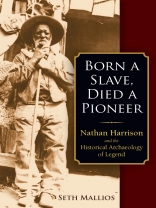Spectacular recent discoveries from the Nathan Harrison cabin site offer new insights and perspectives into the life of this former slave and legendary California homesteader.
“In many ways, it is a quintessential American story because of the fact that slavery was the American story.”—Julia A. King, St. Mary’s College of Maryland
Few people in the history of the United States embody ideals of the American Dream more than Nathan Harrison. His is a story with prominent themes of overcoming staggering obstacles, forging something-from-nothing, and evincing gritty perseverance. In a lifetime of hard-won progress, Harrison survived the horrors of slavery in the Antebellum South, endured the mania of the California Gold Rush, and prospered in the rugged chaos of the Wild West.
From the introduction:
According to dozens of accounts, Harrison would routinely greet visitors to his remote Southern California hillside property with the introductory quip, “I’m N——r Nate, the first white man on the mountain.” This is by far the most common direct quote in all of the extensive Harrison lore. If it is possible to get past current-day shock and outrage over the inflammatory racial epithet, one can begin to contextualize and appreciate the ironic humor, ethnic insight, and dualistically crafted identities Harrison employed in this profound statement.
สารบัญ
List of illustrations
Acknowledgements
Prologue
Introduction
Chapter 1. History, His Story, and Historiography
Chapter 2. The Man, the Myth, the Legend
Chapter 3. Digging for Answers
Conclusion
Epilogue
References
เกี่ยวกับผู้แต่ง
Seth Mallios is Professor of Anthropology, University History Curator, and Director of the South Coastal Information Center at San Diego State University. An archaeologist, anthropologist, and historian, Professor Mallios received his BA from the University of California, Berkeley and his MA and Ph D from the University of Virginia. Dr. Mallios previously served as Site Supervisor at the 1607 James Fort archaeological site in Jamestown, Virginia. Since moving to San Diego in 2001, Professor Mallios has spearheaded six active research projects resulting in nine books, dozens of articles, and nearly $2 million in over 80 extramural grants, contracts, and awards.












